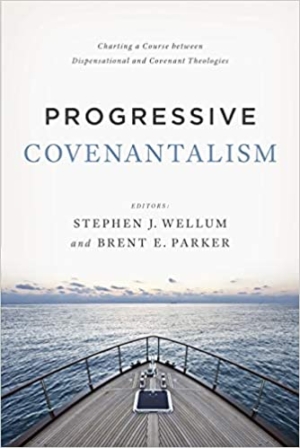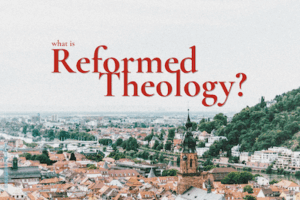Robert Rollock (1555–99) was one of the most significant Reformed theologians in Scotland in the late sixteenth century. He was an important figure in the development of Reformed covenant theology. He received Calvin’s theology and was especially influenced by Caspar Olevianus (1536–87) . . . Continue reading →
reformed theology
Kingdom Through Covenant—Round Two
Kingdom Through Covenant is a massive work of biblical theology written from a Baptistic perspective, now in its second edition.1 My very first attempt at public writing was a review of KTC’s first edition, which I did while in seminary, and which Dr. Clark very graciously posted on The Heidelblog. With more experience, I have often looked back with acute awareness of that review’s weaknesses and wished I could redo it. I am thankful for the chance to review the second edition on the same platform with hopes to improve my comments and assessment concerning this work. Continue reading →
Stop Saying It Please
Reformed people need to stop saying that the distinction between law and gospel is “Lutheran” and that the Reformed did not (and do not) make that distinction. Continue reading
This Is Not Reformed Theology (2)
An Aberration Or Standard In Progressive Covenantalism? Issues About Covenant Conditions
Caneday’s main argument is to undermine the law-gospel distinction. In his words, “This chapter disavows the notion that all of Scripture consists of two isolatable messages: law, consisting of God’s demands, and gospel, composed of God’s gracious giving. Instead, it argues that the formulation of covenant stipulations remain the same while the content of stipulations changes.” (pg. 103; italics original). Continue reading →
The Canons Of Dort On Law And Gospel
In the Canons of Dort the Reformed churches distinguish law and gospel. Continue reading →
Olevianus: The Kingdom And Its Benefits
Since, then, you say that the additional name “Christ” or “Anointed” implies that He came with the command of the Father to establish a royal priesthood, explain first what the kingdom of Christ is. A. A kingdom is a kind of rule . . . Continue reading →
Richard Muller—Jonathan Edwards And The Absence Of Free Choice: A Parting Of Ways In The Reformed Tradition
Lost Audio Recovered
Richard Muller’s lost lecture on Jonathan Edwards’ doctrine of free choice. Continue reading →
Engaging Confessional Baptists on Covenant Theology (Part 1): Typology
The elephant in the room of any discussion about the development of redemptive history is the disagreement between Baptist and Reformed theologies about the unity of the covenant of grace, including the whole language of the covenant’s substance and administration. Continue reading →
Hyper-Calvinism, Rationalism, and Anti-Predestinarians
By definition, hyper-Calvinism is that doctrine which goes beyond (hyper) Calvin. Often, however, it is used incorrectly by critics of predestination to describe anyone who believes in reprobation. If teaching reprobation makes one hyper-Calvinist, then Calvin would be one himself, and that . . . Continue reading →
Mark Stromberg: From Pentecostal To Reformed
Reverend Mark Stomberg of Lynden United Reformed Church in Lynden, WA joins Pastor Chris Gordon to talk all things Pentecostal. Continue reading →
What Is Reformed Theology? (Part 1)
Reformed theology has enjoyed a renaissance of sorts for about thirty years. A renaissance is literally a rebirth or, more broadly, a renewal. In order for there to be a renewal, however, there had to be a classical, defining period of Reformed . . . Continue reading →
What Is Reformed Theology? (Part 2)
Unfortunately, when most people think of Reformed theology, they think of the doctrine of predestination. The reasons for this have more to do with the critics of Reformed theology than with what the Reformed themselves confess. Indeed, one of the great weaknesses of the modern Reformed renaissance is that it tends to re-define Reformed theology almost entirely in terms of the doctrine of divine sovereignty. Continue reading →
What Is Reformed Theology? (Part 3)
The Reformed confession is a catholic confession—that is, it is rooted in the Scriptures as interpreted by the church and confessed in the ancient, ecumenical creeds, but it is also a Reformation confession. Where the medieval church taught justification and salvation by . . . Continue reading →
What Is Reformed Theology? (Part 4)
Since salvation belongs to God, it is he who grants us new life and true faith. As a consequence of the fall, all of Adam’s children (Rom 5:12–21) are, as Paul says, “dead in sins and trespasses” (Eph 2:1). The good news can be expressed in two words: “But God . . .” Continue reading →
What Is Reformed Theology? (Part 5)
Since salvation belongs to God, it is he who grants us new life and true faith. As a consequence of the fall, all of Adam’s children (Rom 5:12–21) are, as Paul says, “dead in sins and trespasses” (Eph 2:1). The good news can be expressed in two words: “But God . . .” Continue reading →
What Is Reformed Theology? (Part 6)
There are Christian traditions that speak of Jesus’ death as primarily an example and there are those that speak exclusively of Jesus’ death relative to his victory over death but the most basic choice we must make is whether he died as . . . Continue reading →
What Is Reformed Theology? (Part 7)
There was a time when most of the world was outside the promises and people of God (Eph 2:12). From the formation of the national Israelite church under Moses, the world was, from the biblical perspective, divided between Jews and Gentiles. The temporary ceremonial and judicial laws, which were fulfilled by Christ and which expired with and were abrogated by his death (Acts 10 [all]), taught that not only certain foods were unclean (and illegal) and defiling but also that whole people groups were also unclean and defiling. Since the Lord instituted the sacrament of circumcision under Abraham (Gen 17:9–14) the Jewish church had been literally and figuratively cut off from the surrounding Gentile religions. Continue reading →









